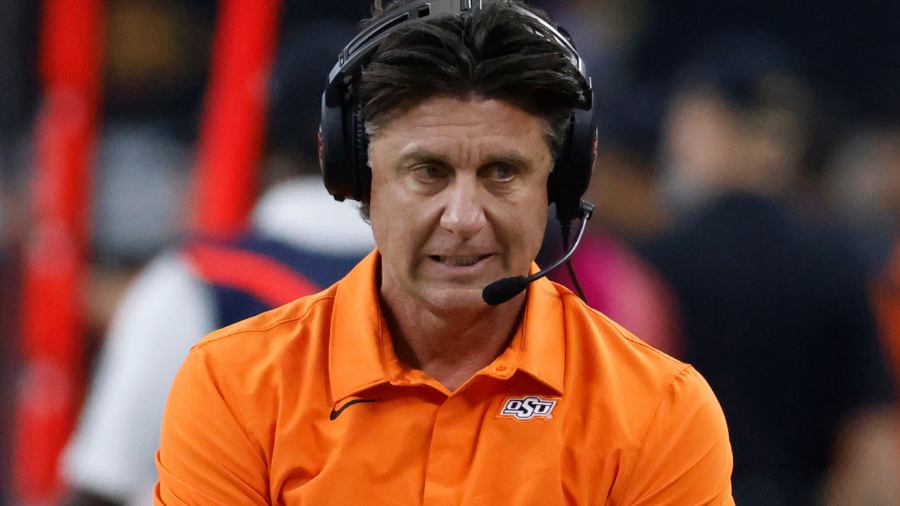Big 12 Football Coach Sees Future Where League Expands Again
Mar 24, 2022, 12:29 PM

ARLINGTON, TX - DECEMBER 4: Head coach Mike Gundy of the Oklahoma State Cowboys walks the sidelines as Oklahoma State takes on the Baylor Bears in the Big 12 Football Championship at AT&T Stadium on December 4, 2021 in Arlington, Texas. Baylor won 21-16. (Photo by Ron Jenkins/Getty Images)
(Photo by Ron Jenkins/Getty Images)
SALT LAKE CITY – Could the Big 12 Conference expand again after BYU, UCF, Cincinnati, and Houston join the league? Of course, it’s always been a possibility. But one current Big 12 football coach, Mike Gundy from Oklahoma State, the league’s elder statesman in football, could see the Big 12 making that possibility a reality.
In a conversation with Berry Tramel from The Oklahoman, Gundy said, “We could be at 14 very easily, five years from now, from what I’m hearing.”
Tramel's ScissorTales: Mike Gundy says that even after OU and Texas depart for the SEC, he believes the Big 12 will settle into a 14-team league. https://t.co/NiAqdVpmtG
— Berry Tramel (@BerryTramel) March 24, 2022
“I think there’s strength in numbers. When you watch this thing, the Big 12 always had some issues, because people would say, there’s only 10 (members).”
In 2023, BYU will join the Big 12 to bring the league up to 11 members while Oklahoma and Texas patiently wait to make their move to the SEC in 2025. The three schools from the American Athletic Conference are believed to be joining in 2023, but it could be a significant hit financially for them to join the same year as BYU. UCF, Cincinnati, and Houston will join no later than July 1, 2024.
The idea that additional expansion could happen isn’t a new concept for the Big 12. Last summer, after OU and Texas shocked the college landscape, the Big 12 created a four-person expansion subcommittee that includes Texas Tech AD Kirby Hocutt. Hocutt noted in August, “there’s no more important topic” than realignment for the next couple of years in the league.
Signed, sealed, delivered!
🚨 Big 12 Conference Adds Four New Membershttps://t.co/BvuPMeRLbx
— Big 12 Conference (@Big12Conference) September 10, 2021
Big 12 Commissioner Bob Bowlsby hasn’t dismissed the idea of the league exploring further expansion after the newcomers settle into their new digs. In September, Bowlsby tossed around the idea of the Big 12 “going to 20 or 24 teams at some point in time” to a group of Baylor reporterers in Waco.
“I think there’s strength in numbers,” Gundy said to The Oklahoman. “I’m speaking out of turn here, because Bowlsby didn’t tell me this. When I just read between the lines, and listen to what people say, including him, even though he’s not speaking directly to the subject, there’s strength in numbers.
“When you have numbers, it allows you to be a little more diversified in what you do. So I wouldn’t be surprised if we’re at 14 in five years.”
Who could the Big 12 target in potential conference expansion?
If the Big 12 did expand again in the future, who would they pursue?
A lot of this will be determined by the Big 12’s new TV contract beginning in 2025. If the league can land money on par with the Pac-12 and ACC, maybe the pipe dream of Arizona and Arizona State could be an option. However, that seems far-fetched with the uncertainty going forward in how the TV dollars shake out.
The ACC is locked into a TV deal with ESPN through 2036 at payouts of around $17 million per school.
Since their rival UCF got invited to the Big 12, USF is stepping up their efforts to get serious about football, recommending a site for an on-campus football stadium paired with a $5 million gift.
Memphis has always been linked to Big 12 expansion talks over the past decade. They were one of the schools in the 2016 expansion process that made pitches to Big 12 executives in Dallas.
If the Big 12 moved west, Boise State has a rich football history over the last quarter-century. Then there’s Colorado State which possibly has the best infrastructure in the Mountain West Conference but lacks on-field results.
Mitch Harper is a BYU Insider for KSLsports.com and host of the Cougar Tracks Podcast (SUBSCRIBE) and Cougar Sports Saturday (Saturday from 12–3 p.m.) on KSL Newsradio. Follow him on Twitter: @Mitch_Harper.












